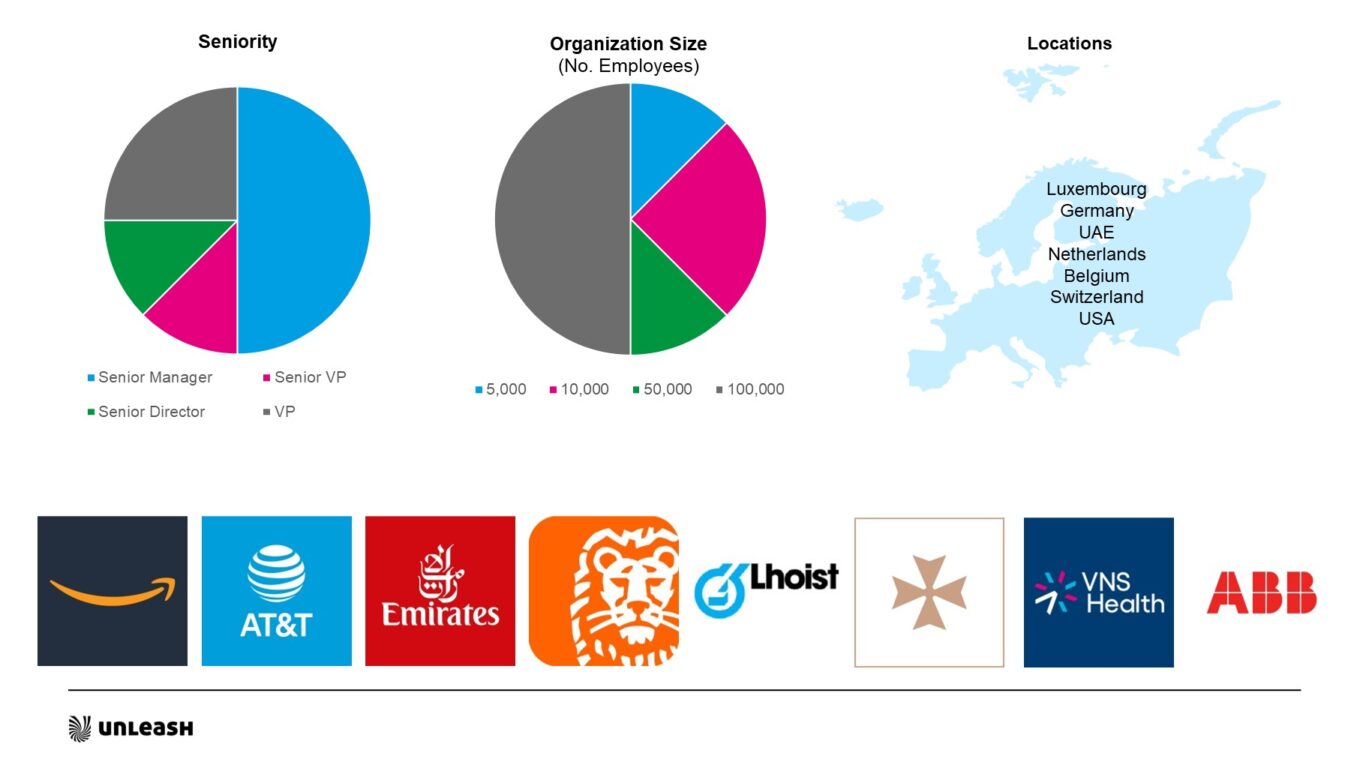How to align your AI-powered EX strategies with 2024 goals and beyond
In this exclusive roundtable, HR leaders discussed an almost ubiquitous topic in the age of GenAI – How does HR harness this interest in technology to meet business goals?
Why You Should Care
In a roundtable of select Fortune 500 HR leaders, the closed door peer group sought each other’s advice and shared best practice on EX.
UNLEASH Editor-in-Chief, Nima Sherpa Green, and Simon Daly, Strategy Director Employee Experience at Qualtrics, co-hosted the 60-minute conversation that also focused on the importance of human-centric culture and belonging.
Becoming a growth driver for employee experience (EX) is a fundamental driver for HR Leaders, and is a growing priority for other C-suite members of the business. But how?
Advances in technology are a part of life, but the balance between advancement, growth, and employee fears can be a headache for even the most experienced HR leaders.
Simon Daly gave participants an insight into the most up-to-date trends in EX shaping the world of work now.
It was a common question from the group: What do we need to be prepared for next?
In a piece of research shared with the UNLEASH Roundtable attendees, Daly took the HR leaders through the top five trends of 2024, globally.
One of the five is the lack of understanding of the role of GenAI by employees around a range of HR tasks. The use of AI in elements such as job interviews and end-of-year appraisals is being met with mistrust. Whereas the use of AI in administrative tasks is being more widely accepted. He called it “the dichotomy of convenience vs the human element”.
However, one interesting outlier was that data from those with a physical or mental disability were much more likely to embrace the use of AI in job interviews – with feedback that they felt there would be less bias towards them.
Participants in the roundtable shared examples of how they see some of these trends playing out in their businesses.
One Fortune 500 HR Leader called on her peers to tackle the mistrust of AI in EX head-on.
“We have to make them understand the value add,” she said.
“And sometimes that involves taking functions such as recruiters on a journey through the process. We showed them how much time they could save, and what they could produce in those back-to-back interviews.”
She added: “And then for the business, we had to make our case that AI is low risk in terms of the selection process for talent.”
Being clear on what GenAI means for EX
However, one speaker highlighted the need to educate both fellow leaders in the business, as well as employees on what GenAI means.
“What are we defining as AI here?”
“Because a business can go down a path of talking about machine learning or large language (LLM) etc. So, my advice is to be very specific about what we mean by AI and its applications for business and HR…I think this will help us when we talk about making the case for the benefits.”
Several participants agreed with one adding that there is a need for HR to take the role as “myth-busters”.
Two participants talked about the pushback from employees who ask for more human interactions instead of chatbots or automated processes.
One DACH HR leader encapsulated the dilemma: “People are asking for us to put the ‘H’ back in HR.
“They say, ‘Why can I not just reach out to someone in HR?’ It is a challenge.
“So, we are very interested in any initiative helping a business to make technological advancements more human.”
Daly addressed this pain point.
“It’s really important that you talk about the ethics that sit underneath the technological advancement you want to have. That allows you to move at a faster pace when you get that buy-in: when you have guard rails. That improves the comfort level and reception within the business. That’s where I see companies make more strides than others.”
Another roundtable attendee then shared his best practice advice:
“Look to where this technology has already been adopted, and it’s usually the part of the business that is closer to the customer. Look at emulating those same guardrails and protocols, and reviews…That will help you make your case on risk vs reward.”
To close the roundtable discussion Daly offered his key takeaways to participants, reiterating the importance of being clear and honest about changes to the employee experience that are on the horizon “to help everyone feel they have true buy-in…It’s a huge opportunity in HR.”
HR Leader Attendee Demographics

Why join a UNLEASH roundtable?
Our exclusive virtual Roundtables are designed to explore where HR leaders are focused now, key challenges, and prioritizations for the rest of the year. We’ll dig into what matters most when planning for what’s next and equip you with your future strategy. You’ll be joined by senior HR practitioner peers, allowing an opportunity to discuss personal experiences of challenges and wins, providing the ability to benchmark and reconsider current strategies and tech together.
Check out our upcoming events here: HR Roundtables
Sign up to the UNLEASH Newsletter
Get the Editor’s picks of the week delivered straight to your inbox!

Editor-in-Chief
Nima Sherpa Green is a British/Sherpa journalist and editor. She has a multimedia background in newsrooms around the world. She was the UK & EMEA editor of CRN; commissioning editor at The African Business Magazine; producer and reporter at the World Service London Bureau; and reported for Vice Magazine and the Herald Sun in Australia. She has an MA in Journalism from Monash University, Melbourne and a BA in Political History of Southern Africa from the University of Sheffield.

